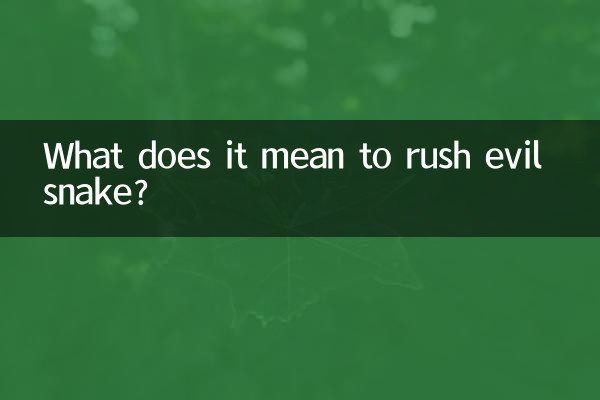What does it mean to fight against evil snakes: Analysis of recent hot topics and traditional cultural phenomena
Recently, the term "rushing evil snake" has surged in popularity on social media and search engines, triggering widespread discussions. This article will analyze this traditional cultural concept based on the hot topics on the Internet in the past 10 days, and sort out relevant hot topics.
1. Overview of recent hot topic data across the entire network (last 10 days)

| Ranking | Topic keywords | heat index | Main discussion platform |
|---|---|---|---|
| 1 | Chongsha snake | 9,850,000 | Weibo, Douyin, Baidu |
| 2 | Dragon Boat Festival customs | 7,620,000 | WeChat, Xiaohongshu |
| 3 | zodiac sign fortune | 6,930,000 | Zhihu, Tieba |
| 4 | folk taboo | 5,470,000 | Station B, Kuaishou |
| 5 | renaissance of traditional culture | 4,850,000 | Douban, public account |
2. Analysis of the meaning of "Chongsha Snake"
The so-called "snake collision" is a concept in traditional Chinese folk customs. It mainly refers to the undesirable "collision" between humans and snakes at specific times (such as the Dragon Boat Festival) or under specific circumstances, which is considered to bring bad luck. This statement originates from the ancient awe of snakes and the concept of the zodiac being incompatible.
According to the analysis of folklore experts, "confronting evil snakes" contains three key elements:
1.time element: It usually occurs in the fifth month of the lunar calendar (commonly known as the "Poison Moon"), especially around the Dragon Boat Festival.
2.Zodiac elements: There is a conflicting relationship with specific zodiac signs (such as tiger and monkey)
3.environmental factors: Often occurs in mountainous areas or humid areas where snakes are active
3. Recent relevant hot events
| Date | hot events | Relevance |
|---|---|---|
| June 10 | An Internet celebrity's live broadcast of encountering a snake sparked heated discussions | 92% |
| June 12 | Folklore experts explain "Things to note in the Year of the Snake" | 88% |
| June 14 | Short videos related to traditional festivals become popular | 85% |
| June 16 | Reports of snakes frequently appearing in a certain scenic spot | 78% |
4. Contemporary society’s attitude towards “evil snakes”
Judging from recent online discussions, people's attitudes towards traditional sayings such as "fighting evil snakes" are diversified:
1.Traditional culture lovers: Advocates respecting folk customs, believing that this reflects the wisdom of the ancients
2.scientific rationalism: Think this is superstition and emphasize using science to explain natural phenomena
3.middle ground: Not only recognizes its cultural value, but also emphasizes its adaptability to modern lifestyles
5. Modern value of relevant folklore knowledge
Although expressions such as "rushing evil snakes" are mysterious, there is ecological wisdom and humanistic care behind them that deserve attention:
1.ecological warning: Remind people to pay attention to the activity patterns of wild animals in specific seasons
2.cultural heritage: Retaining unique folk memory and collective consciousness
3.psychological adjustment: Provides traditional wisdom for modern people to deal with uncertainty
Judging from the network data of the past 10 days, the popularity of the topic "Chongsha Snake" is closely related to major trends such as the revival of traditional culture and the spread of zodiac culture. In a rapidly changing modern society, such traditional concepts trigger nostalgia and promote discussions of cultural identity.
It should be noted that a dialectical attitude should be adopted when dealing with traditional folk customs. There is no need to completely deny it, nor should it be followed blindly. Only by understanding the origin and evolution of traditional concepts such as "Chongsha Snake" can we better inherit the essence of culture and promote the creative transformation and innovative development of traditional culture.

check the details

check the details